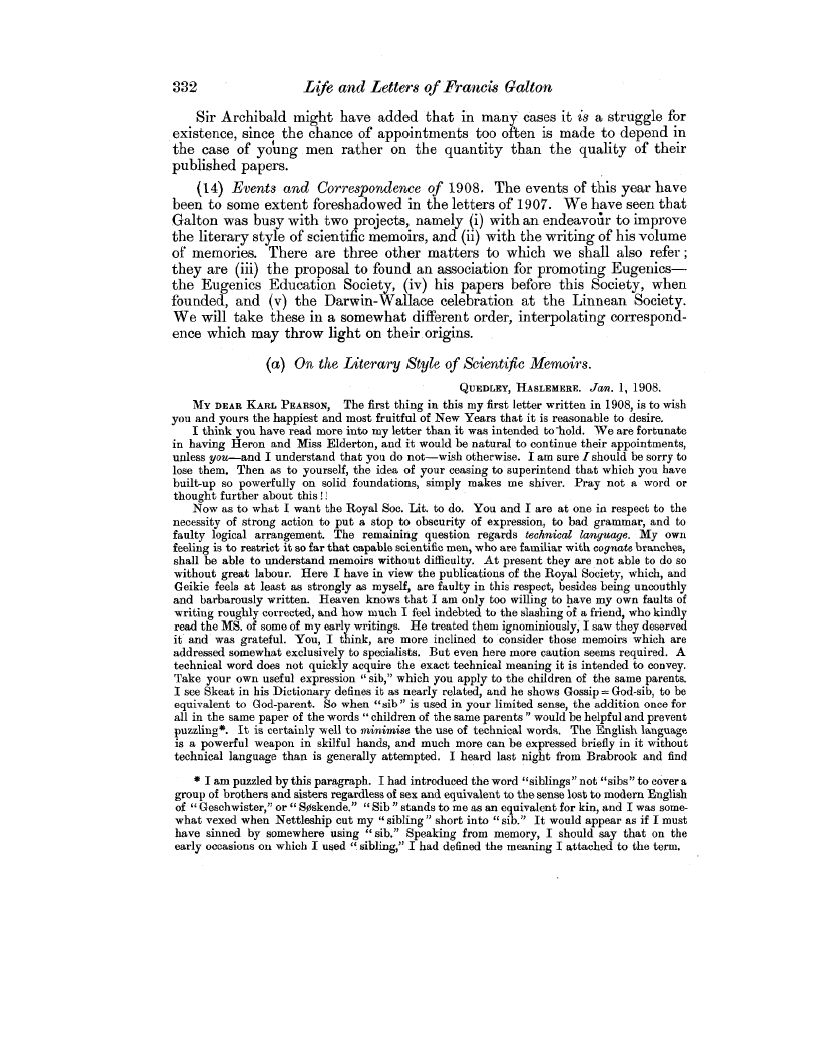| ||||||

OCR Rendition - approximate
332 Life and Letters of Francis Galton Sir Archibald might have added that in many cases it is a struggle for existence, since the chance of appointments too often is made to depend in the case of young men rather on the quantity than the quality of their published papers. (14) Events and Correspondence of 1908. The events of this year have been to some extent foreshadowed in the letters of 1907. We have seen that Galton was busy with two projects, namely (i) with an endeavour to improve the literary style of scientific memoirs, and (ii) with the writing of his volume of memories. There are three other matters to which we shall also refer; they are (iii) the proposal to found an association for promoting Eugenicsthe Eugenics Education Society, (iv) his papers before this Society, when founded, and (v) the Darwin-Wallace celebration at the Linnean Society. We will take these in a somewhat different order, interpolating correspondence which may throw light on their origins. (a) On the Literary Style of Scientific Memoirs. QUEDLEY, HASLEMERE. Jan. 1, 1908. MY DEAR KARL PEARSON, The first thing in this my first letter written in 1908, is to wish you and yours the happiest and most fruitful of New Years that it is reasonable to desire. I think you have read more into my letter than it was intended to-hold. We are fortunate in having Heron and Miss Elderton, and it would be natural to continue their appointments, unless you-and I understand that you do not-wish otherwise. I am sure I should be sorry to lose them. Then as to yourself, the idea of your ceasing to superintend that which you have built-up so powerfully on solid foundations, simply makes me shiver. Pray not a word or thought further about this ! ! Now as to what I want the Royal Soc. Lit. to do. You and I are at one in respect to the necessity of strong action to put a stop to obscurity of expression, to bad grammar, and to faulty logical arrangement. The remaining question regards technical language. My own feeling is to restrict it so far that capable scientific men, who are familiar with cognate branches, shall be able to understand memoirs without difficulty. At present they are not able to do so without great labour. Here I have in view the publications of the Royal Society, which, and Geikie feels at least as strongly as myself, are faulty in this respect, besides being uncouthly and barbarously written. Heaven knows that I am only too willing to have my own faults of writing roughly corrected, and how much I feel indebted to the slashing of a friend, who kindly read the MS. of some of my early writings. He treated them ignominiously, I saw they deserved it and was grateful. You, I think, are more inclined to consider those memoirs which are addressed somewhat exclusively to specialists. But even here more caution seems required. A technical word does not quickly acquire the exact technical meaning it is intended to convey. Take your own useful expression "sib," which you apply to the children of the same parents. I see Skeat in his Dictionary defines it as nearly related, and he shows Gossip = God-sib, to be equivalent to God-parent. So when "sib" is used in your limited sense, the addition once for all in the same paper of the words " children of the same parents " would be helpful and prevent puzzling*. It is certainly well to minimise the use of technical words. The English language is a powerful weapon in skilful bands, and much more can be expressed briefly in it without technical language than is generally attempted. I heard last night from Brabrook and find * I am puzzled by this paragraph. I had introduced the word "siblings" not "sibs" to cover a group of brothers and sisters regardless of sex and equivalent to the sense lost to modern English of " Geschwister," or "Soskende." " Sib " stands to me as an equivalent for kin, and I was somewhat vexed when Nettleship cut my "sibling" short into "sib." It would appear as if I must have sinned by somewhere using " sib." Speaking from memory, I should say that on the early occasions on which I used ". sibling," I had defined the meaning I attached to the term.
|